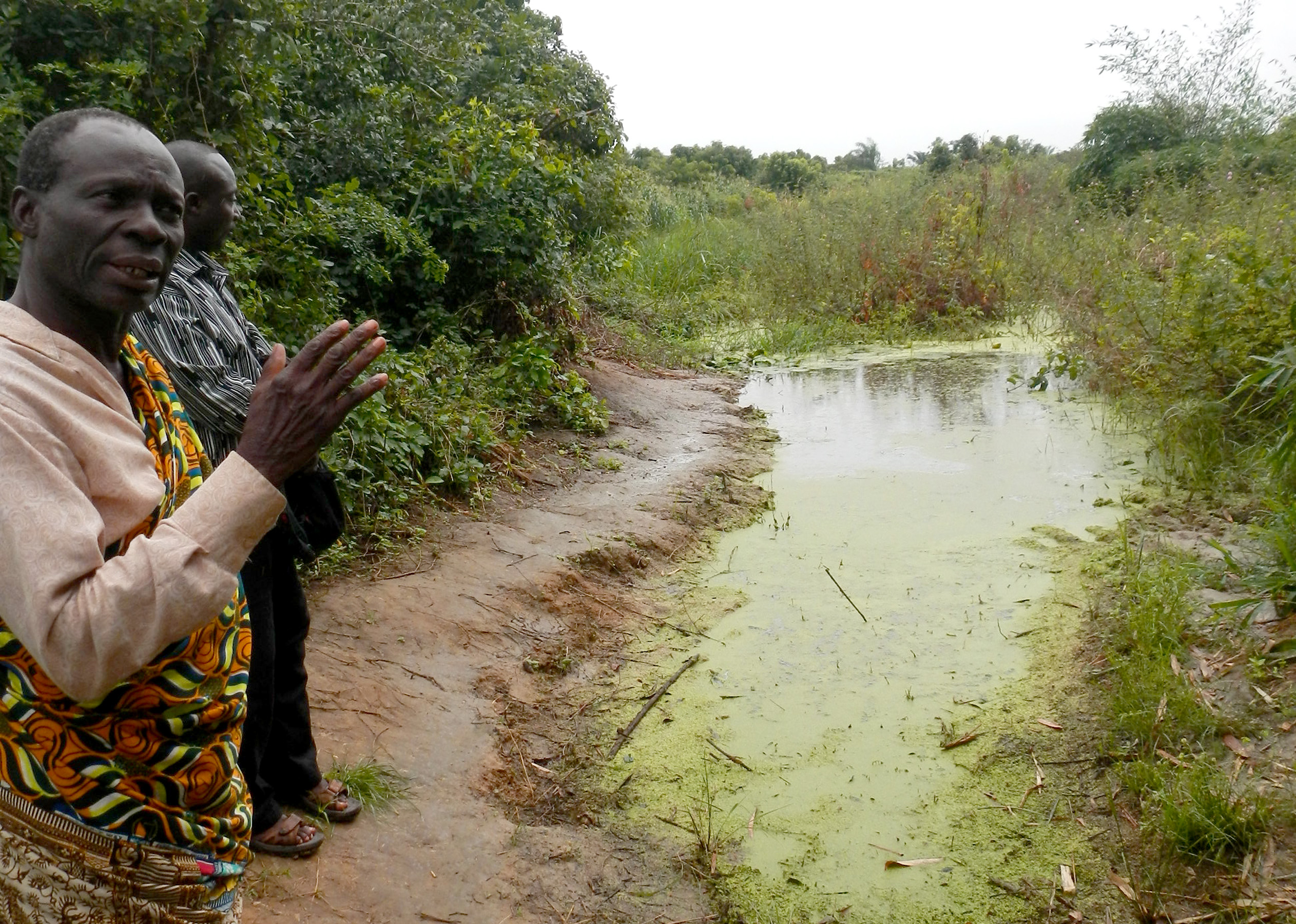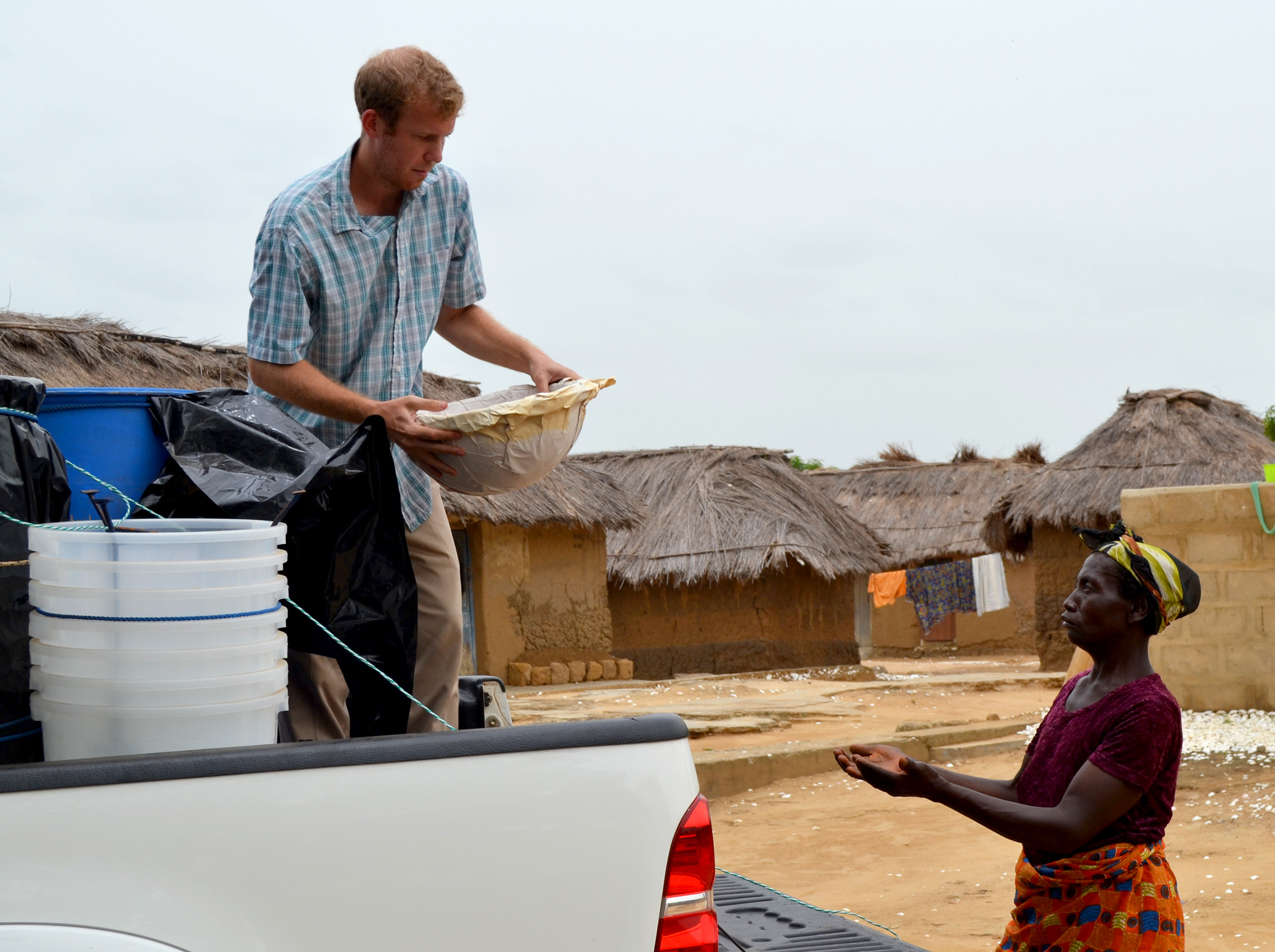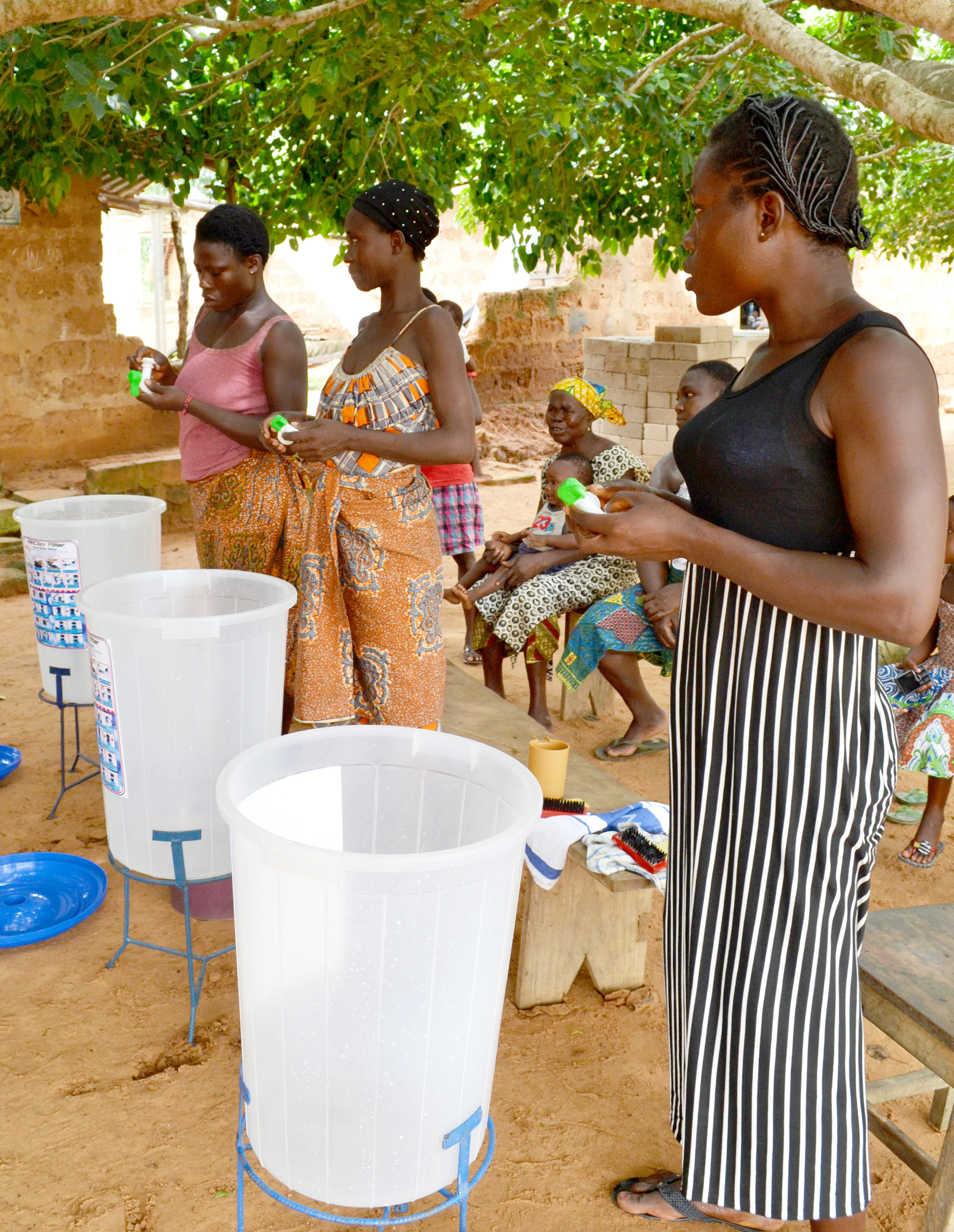MENU
(June 24, 2015 - by Harold Goerzen) Andrew and Laura Rescorla were in a quandary. Missionary engineers with Reach Beyond, they’d traveled to eastern Ghana’s Volta region to meet with local villagers about their water problems.
This is an area where several of the mission’s summer interns had visited two years ago, confirming reports from media partner Theovision about the tainted water supply and lack of hygiene in local communities.
Theovision had formed Bible-listening clubs years earlier and had distributed Megavoices—digital audio players loaded with recordings of the Bible in their language.
 “At the two villages we visited—Ketisinu and Doglokpo—the people fetch water from nearby waterholes,” explained Andrew, a civil engineer. “These waterholes are horribly dirty, surely loaded with disease-causing bacteria.”
“At the two villages we visited—Ketisinu and Doglokpo—the people fetch water from nearby waterholes,” explained Andrew, a civil engineer. “These waterholes are horribly dirty, surely loaded with disease-causing bacteria.”
The residents used to get water from nearby streams and rivers, but they’re often dry because of a new dam built upriver. “This has had a profound effect on the people living in this region. They can no longer fish in the nearby rivers and, more importantly, they now struggle to access water,” Andrew added.
As the Rescorlas discussed options with village leaders, their frustrations only grew. Drilling boreholes wasn’t recommended because the water is too salty, only available seasonally or both.
“But Laura and I came to these villages with some ideas,” Andrew said. “Since some of the houses had metal roofs, we thought perhaps we could fit gutters to the roofs and pipe the water into storage tanks.”
 “However, our ideas didn’t match up with the people’s ideas,” he lamented, adding that village leaders only wanted to expand their muddy waterholes. Speaking through a translator, the local people made comments such as “we will accept whatever you give us” and “beggars can’t be choosers.”
“However, our ideas didn’t match up with the people’s ideas,” he lamented, adding that village leaders only wanted to expand their muddy waterholes. Speaking through a translator, the local people made comments such as “we will accept whatever you give us” and “beggars can’t be choosers.”
“That was the last thing we wanted to hear,” Andrew said. “We don’t want them to feel like beggars. We don’t want to simply give them things.”
Finally, the Rescolas suggested the villagers try using clay pot filters—the same kind that they use in their home in Accra—to improve the quality of the water they had. An organization in northern Ghana had developed a “simple but extremely effective clay pot filter” that would be available at a discounted price of US$12.
Despite the village leaders’ skepticism, the Rescorlas returned with a sample filter. “After we set it on a bench, the people looked at the filter, touched it and watched water flow through it. Someone brought a cup so people could taste the filtered water. They told us they had never seen anything like it. There was a lot of animated discussion as they inspected it and tasted the water.”
 In April the Rescorlas went back again, this time with 13 filters—seven for one village and six for the other. The clay pots have tiny pores that screen out impurities from the water.
In April the Rescorlas went back again, this time with 13 filters—seven for one village and six for the other. The clay pots have tiny pores that screen out impurities from the water.
A month later the Rescorlas returned to check on the filters. “Though we didn’t go into every house, it looks like people are using the filters and are happy with the results,” said Laura, an environmental engineer.
She and Andrew also showed them how to tighten and adjust the washers and taps, preventing leaks, and demonstrated good hygiene techniques, including the importance of cleaning the filters.
“The people were excited and enthusiastic about the filters,” added Laura. “Several people who hadn’t purchased the filters that day were hanging around watching the cleaning workshop or asking about them.”
“We’ll continue to develop a relationship with these communities,” she concluded. “We hope that addressing this physical need will help give weight to the words that Theovision and the local pastor share about our God who cares for the physical as well as the spiritual.”
Source: Reach Beyond
This is an area where several of the mission’s summer interns had visited two years ago, confirming reports from media partner Theovision about the tainted water supply and lack of hygiene in local communities.
Theovision had formed Bible-listening clubs years earlier and had distributed Megavoices—digital audio players loaded with recordings of the Bible in their language.
 “At the two villages we visited—Ketisinu and Doglokpo—the people fetch water from nearby waterholes,” explained Andrew, a civil engineer. “These waterholes are horribly dirty, surely loaded with disease-causing bacteria.”
“At the two villages we visited—Ketisinu and Doglokpo—the people fetch water from nearby waterholes,” explained Andrew, a civil engineer. “These waterholes are horribly dirty, surely loaded with disease-causing bacteria.”The residents used to get water from nearby streams and rivers, but they’re often dry because of a new dam built upriver. “This has had a profound effect on the people living in this region. They can no longer fish in the nearby rivers and, more importantly, they now struggle to access water,” Andrew added.
As the Rescorlas discussed options with village leaders, their frustrations only grew. Drilling boreholes wasn’t recommended because the water is too salty, only available seasonally or both.
“But Laura and I came to these villages with some ideas,” Andrew said. “Since some of the houses had metal roofs, we thought perhaps we could fit gutters to the roofs and pipe the water into storage tanks.”
 “However, our ideas didn’t match up with the people’s ideas,” he lamented, adding that village leaders only wanted to expand their muddy waterholes. Speaking through a translator, the local people made comments such as “we will accept whatever you give us” and “beggars can’t be choosers.”
“However, our ideas didn’t match up with the people’s ideas,” he lamented, adding that village leaders only wanted to expand their muddy waterholes. Speaking through a translator, the local people made comments such as “we will accept whatever you give us” and “beggars can’t be choosers.”“That was the last thing we wanted to hear,” Andrew said. “We don’t want them to feel like beggars. We don’t want to simply give them things.”
Finally, the Rescolas suggested the villagers try using clay pot filters—the same kind that they use in their home in Accra—to improve the quality of the water they had. An organization in northern Ghana had developed a “simple but extremely effective clay pot filter” that would be available at a discounted price of US$12.
Despite the village leaders’ skepticism, the Rescorlas returned with a sample filter. “After we set it on a bench, the people looked at the filter, touched it and watched water flow through it. Someone brought a cup so people could taste the filtered water. They told us they had never seen anything like it. There was a lot of animated discussion as they inspected it and tasted the water.”
 In April the Rescorlas went back again, this time with 13 filters—seven for one village and six for the other. The clay pots have tiny pores that screen out impurities from the water.
In April the Rescorlas went back again, this time with 13 filters—seven for one village and six for the other. The clay pots have tiny pores that screen out impurities from the water.A month later the Rescorlas returned to check on the filters. “Though we didn’t go into every house, it looks like people are using the filters and are happy with the results,” said Laura, an environmental engineer.
She and Andrew also showed them how to tighten and adjust the washers and taps, preventing leaks, and demonstrated good hygiene techniques, including the importance of cleaning the filters.
“The people were excited and enthusiastic about the filters,” added Laura. “Several people who hadn’t purchased the filters that day were hanging around watching the cleaning workshop or asking about them.”
“We’ll continue to develop a relationship with these communities,” she concluded. “We hope that addressing this physical need will help give weight to the words that Theovision and the local pastor share about our God who cares for the physical as well as the spiritual.”
Source: Reach Beyond
